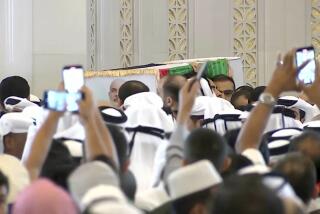GULF WATCH: Day 107 : A Daily Briefing Paper On Developments In The Crisis
- Share via
Diplomatic Front:
Egyptian President Hosni Mubarak asked the United States to postpone military action against Iraq for up to three months, while a senior Egyptian diplomat said that Egypt is not committed to wiping out Iraq’s military capability. The remarks by Mubarak and Egypt’s ambassador to Saudi Arabia, Sayed Misri, mark a continuing move by Egypt toward moderating demands for a decisive resolution that would destroy Iraq.
In Brussels for international economic meetings, Secretary of State James A. Baker III rejected Soviet envoy Yevgeny Primakov’s suggestion that a solution to the Persian Gulf crisis be linked to the problem of Israel’s occupation of land claimed by Palestinians. Baker said there could be no rewards for aggression. Political Front:
House and Senate leaders accepted President Bush’s invitation to join the First Family in their Thanksgiving with the troops in Saudi Arabia. Both chambers are to hold hearings on the gulf policy in early December. House Armed Services Committee Chairman Les Aspin (D-Wis.) declared at a press breakfast that even though the Bush Administration must do a better job of explaining the troop buildup to the public, the step was justified. Military Front:
The Pentagon called to active duty another 15,000 reserve and National Guard troops as part of the massive new buildup of U.S. forces in the Persian Gulf. The call-up brings to 51,000 the number of citizen troops now activated for crisis duty. The latest troops summoned are to serve at least 180 days. Oil Prices:
Crude oil close: $29.78 a barrel, down $1.24.
Price peak since invasion: $41.15 on Oct. 10.
Price before the invasion: $20 a barrel.
More to Read
Sign up for Essential California
The most important California stories and recommendations in your inbox every morning.
You may occasionally receive promotional content from the Los Angeles Times.













